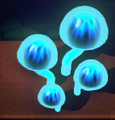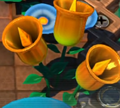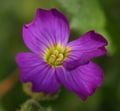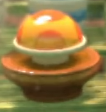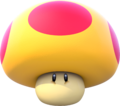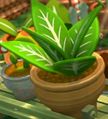Pikmin Adventure vegetation: Difference between revisions
No edit summary |
(Added Russian name meanings, pronunciation and notes (where applicable)) |
||
| (3 intermediate revisions by 3 users not shown) | |||
| Line 5: | Line 5: | ||
*Add a brief description and general location description. | *Add a brief description and general location description. | ||
}} | }} | ||
{{needs translation|Dutch|French | {{needs translation|Dutch|French|Spanish}} | ||
==Abundant Mass== | ==Abundant Mass== | ||
| Line 35: | Line 35: | ||
|SpaM = | |SpaM = | ||
|PorP = Bloco Grandalhão | |PorP = Bloco Grandalhão | ||
|PorPM = | |PorPM = Bulky Block | ||
|PorPN = | |PorPN = | ||
|Rus = Увесистый блок | |Rus = Увесистый блок | ||
|RusR = | |RusR = Uvesistyy blok | ||
|RusM = | |RusM = Heavy Block | ||
|RusN = | |RusN = | ||
|notes = y | |notes = y | ||
| Line 73: | Line 73: | ||
|SpaM = | |SpaM = | ||
|PorP = Abeto | |PorP = Abeto | ||
|PorPM = | |PorPM = Fir Tree | ||
|PorPN = | |PorPN = | ||
|Rus = Пихта | |Rus = Пихта | ||
|RusR = | |RusR = Pikhta | ||
|RusM = | |RusM = Fir Tree | ||
|RusN = | |RusN = | ||
|notes = y | |notes = y | ||
| Line 110: | Line 110: | ||
|SpaM = | |SpaM = | ||
|PorP = Esporo Etéreo | |PorP = Esporo Etéreo | ||
|PorPM = | |PorPM = Ethereal Spore | ||
|PorPN = | |PorPN = | ||
|Rus = Споронос клубнеголова | |Rus = Споронос клубнеголова | ||
|RusR = | |RusR = Sporonos klubnegolova | ||
|RusM = | |RusM = Bulborb's Spore Carrier | ||
|RusN = | |RusN = {{tt|Клубнеголов|klubnegolov}} is the Russian name for Bulborb | ||
|notes = y | |notes = y | ||
}} | }} | ||
| Line 147: | Line 147: | ||
|SpaM = | |SpaM = | ||
|PorP = Esculturas Pikmin | |PorP = Esculturas Pikmin | ||
|PorPM = | |PorPM = Pikmin Sculptures | ||
|PorPN = | |PorPN = | ||
|Rus = Деревянный пикмин | |Rus = Деревянный пикмин | ||
|RusR = | |RusR = Derevyannyy pikmin | ||
|RusM = | |RusM = Wooden Pikmin | ||
|RusN = | |RusN = | ||
|notes = y | |notes = y | ||
| Line 185: | Line 185: | ||
|SpaM = | |SpaM = | ||
|PorP = Palmeira | |PorP = Palmeira | ||
|PorPM = | |PorPM = Palm Tree | ||
|PorPN = | |PorPN = | ||
|Rus = Пальма | |Rus = Пальма | ||
|RusR = | |RusR = Pal'ma | ||
|RusM = | |RusM = Palm Tree | ||
|RusN = | |RusN = | ||
|notes = y | |notes = y | ||
| Line 222: | Line 222: | ||
|SpaM = | |SpaM = | ||
|PorP = Família Fungiforme | |PorP = Família Fungiforme | ||
|PorPM = | |PorPM = Fungiform Family | ||
|PorPN = | |PorPN = | ||
|Rus = Семья грибов | |Rus = Семья грибов | ||
|RusR = | |RusR = Sem'ya gribov | ||
|RusM = | |RusM = Mushroom Family | ||
|RusN = | |RusN = | ||
|notes = y | |notes = y | ||
| Line 259: | Line 259: | ||
|SpaM = | |SpaM = | ||
|PorP = Esporo Glacial | |PorP = Esporo Glacial | ||
|PorPM = | |PorPM = Glacial Spore | ||
|PorPN = | |PorPN = | ||
|Rus = Ледниковая поганка | |Rus = Ледниковая поганка | ||
|RusR = | |RusR = Lednikovaya poganka | ||
|RusM = | |RusM = Glacial Toadstool | ||
|RusN = | |RusN = | ||
|notes = y | |notes = y | ||
| Line 298: | Line 298: | ||
|SpaM = | |SpaM = | ||
|PorP = Planta Amigável | |PorP = Planta Amigável | ||
|PorPM = | |PorPM = Friendly Plant | ||
|PorPN = | |PorPN = | ||
|Rus = Дружелюбное растение | |Rus = Дружелюбное растение | ||
|RusR = | |RusR = Druzhelyubnoye rasteniye | ||
|RusM = | |RusM = Friendly Plant | ||
|RusN = | |RusN = | ||
|notes = y | |notes = y | ||
| Line 336: | Line 336: | ||
|SpaM = | |SpaM = | ||
|PorP = Planta Invernal | |PorP = Planta Invernal | ||
|PorPM = | |PorPM = Wintry Plant | ||
|PorPN = | |PorPN = | ||
|Rus = Морозное растение | |Rus = Морозное растение | ||
|RusR = | |RusR = Moroznoye rasteniye | ||
|RusM = | |RusM = Frosty Plant | ||
|RusN = | |RusN = | ||
|notes = y | |notes = y | ||
| Line 374: | Line 374: | ||
|SpaM = | |SpaM = | ||
|PorP = Feto | |PorP = Feto | ||
|PorPM = | |PorPM = Fern | ||
|PorPN = | |PorPN = | ||
|Rus = Папоротник | |Rus = Папоротник | ||
|RusR = | |RusR = Paporotnik | ||
|RusM = | |RusM = Fern | ||
|RusN = | |RusN = | ||
|notes = y | |notes = y | ||
| Line 411: | Line 411: | ||
|SpaM = | |SpaM = | ||
|PorP = Árvore Retorcida | |PorP = Árvore Retorcida | ||
|PorPM = | |PorPM = Twisted Tree | ||
|PorPN = | |PorPN = | ||
|Rus = Дерево с плющом | |Rus = Дерево с плющом | ||
|RusR = | |RusR = Derevo s plyushchom | ||
|RusM = | |RusM = Tree with Ivy | ||
|RusN = | |RusN = | ||
|notes = y | |notes = y | ||
| Line 448: | Line 448: | ||
|SpaM = | |SpaM = | ||
|PorP = Pinheiro Riscado | |PorP = Pinheiro Riscado | ||
|PorPM = | |PorPM = Striped Pine Tree | ||
|PorPN = | |PorPN = | ||
|Rus = Полосатая ель | |Rus = Полосатая ель | ||
|RusR = | |RusR = Polosataya yel' | ||
|RusM = | |RusM = Striped Spruce Tree | ||
|RusN = | |RusN = | ||
|notes = y | |notes = y | ||
| Line 486: | Line 486: | ||
|SpaM = | |SpaM = | ||
|PorP = Planta Pragmática | |PorP = Planta Pragmática | ||
|PorPM = | |PorPM = Pragmatic Plant | ||
|PorPN = | |PorPN = | ||
|Rus = Находчивое растение | |Rus = Находчивое растение | ||
|RusR = | |RusR = Nakhodchivoye rasteniye | ||
|RusM = | |RusM = Resourceful Plant | ||
|RusN = | |RusN = | ||
|notes = y | |notes = y | ||
| Line 524: | Line 524: | ||
|SpaM = | |SpaM = | ||
|PorP = Planta Espevitada | |PorP = Planta Espevitada | ||
|PorPM = | |PorPM = Lively Plant | ||
|PorPN = | |PorPN = | ||
|Rus = Забавное растение | |Rus = Забавное растение | ||
|RusR = | |RusR = Zabavnoye rasteniye | ||
|RusM = | |RusM = Funny Plant | ||
|RusN = | |RusN = | ||
|notes = y | |notes = y | ||
| Line 562: | Line 562: | ||
|SpaM = | |SpaM = | ||
|PorP = Rebento por Florir | |PorP = Rebento por Florir | ||
|PorPM = | |PorPM = Bud Yet-to-Bloom | ||
|PorPN = | |PorPN = | ||
|Rus = Растение с бутоном | |Rus = Растение с бутоном | ||
|RusR = | |RusR = Rasteniye s butonom | ||
|RusM = | |RusM = Plant with a Bud | ||
|RusN = | |RusN = | ||
|notes = y | |notes = y | ||
Latest revision as of 08:50, December 28, 2024
Pikmin Adventure has a variety of plants and fungi exclusive to it. They typically do not affect gameplay in any way, instead serving as decorations. They can be unlocked as collectible figures in the Nintendo Land Plaza, however. Because of the theme Nintendo Land objects are based on, these "plants" are artificial, and some do not even resemble traditional plants at all.
|
The following article or section is in need of assistance from someone who plays Pikmin Adventure.
|
|
The following article or section needs help from someone who can translate Dutch/French/Spanish text. |
Abundant Mass[edit]
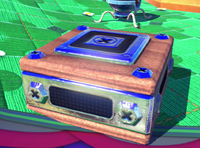
Known as the Chunky Block in the European version.
Monita's notes[edit]
 US version: “This distinctive work of modern art conveys a sense of weight and permanence. Also, these are scattered all over the place underground, so please don't stub your toe.”
US version: “This distinctive work of modern art conveys a sense of weight and permanence. Also, these are scattered all over the place underground, so please don't stub your toe.” European version: “A distinctive work of modern art that conveys a sense of weight and permanence. ◆ Also, these are scattered all over the place underground, so please don't stub your toe.”
European version: “A distinctive work of modern art that conveys a sense of weight and permanence. ◆ Also, these are scattered all over the place underground, so please don't stub your toe.”
Names in other languages[edit]
| Language | Name | Meaning | Notes |
|---|---|---|---|
| ずっしりブロック? Zusshiri Burokku |
Heavy Block | ||
| Zwaar blok | |||
| Bloc lourd | |||
| Klobiger Block | Clunky Block | ||
| Blocco pesante | Heavy block | ||
| Bloco Grandalhão | Bulky Block | ||
| Bloque macizo | |||
| Увесистый блок Uvesistyy blok |
Heavy Block |
Angular Sapling[edit]
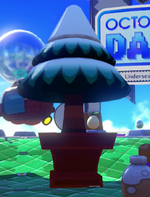
Known as the Fir Tree in the European version.
Monita's notes[edit]
 US version: “The fir tree is classified as an evergreen, long a symbol of vitality and eternal life. This one seems to be covered in snow, though. So much for the "ever green." Hah. Hah.”
US version: “The fir tree is classified as an evergreen, long a symbol of vitality and eternal life. This one seems to be covered in snow, though. So much for the "ever green." Hah. Hah.” European version: “The fir tree is an evergreen, a symbol of vitality and eternal life. ◆ This one seems to be covered in snow, though. So much for the "ever green".”
European version: “The fir tree is an evergreen, a symbol of vitality and eternal life. ◆ This one seems to be covered in snow, though. So much for the "ever green".”
Names in other languages[edit]
| Language | Name | Meaning | Notes |
|---|---|---|---|
| モミの木? Mominoki |
Fir Tree | ||
| Dennenboom | |||
| Sapin | |||
| Tannenbaum | Fir Tree | ||
| Abete | Spruce | ||
| Abeto | Fir Tree | ||
| Abeto | |||
| Пихта Pikhta |
Fir Tree |
Bulbous Sporehaven[edit]

Monita's notes[edit]
 US version: “Perplexing, isn't it? Nobody knows if it's vegetable or...something more sinister.”
US version: “Perplexing, isn't it? Nobody knows if it's vegetable or...something more sinister.” European version: “Curious, isn't it? This so-called mushroom doesn't look like any mushroom I've ever seen.”
European version: “Curious, isn't it? This so-called mushroom doesn't look like any mushroom I've ever seen.”
Names in other languages[edit]
| Language | Name | Meaning | Notes |
|---|---|---|---|
| 秋の味覚? Aki no Mikaku |
Autumn Taste | ||
| Herfstpaddenstoel | |||
| Champignon automnal | |||
| Herbstpilz | Fall Mushroom | ||
| Fungo autunnale | Autumnal mushroom | ||
| Esporo Etéreo | Ethereal Spore | ||
| Champiñón otoñal | |||
| Споронос клубнеголова Sporonos klubnegolova |
Bulborb's Spore Carrier | Клубнеголов is the Russian name for Bulborb |
Carved Pikmin[edit]
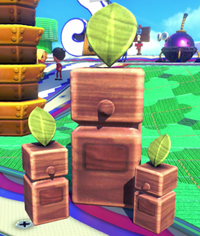
Monita's notes[edit]
 US version: “These curious sculptures almost seem to move by dim underground light. Some people even mistake them for Pikmin. Not me, of course.”
US version: “These curious sculptures almost seem to move by dim underground light. Some people even mistake them for Pikmin. Not me, of course.” European version: “Curious sculptures that by dim underground light almost seem to move. ◆ Some people even mistake them for Pikmin. Not me, of course.”
European version: “Curious sculptures that by dim underground light almost seem to move. ◆ Some people even mistake them for Pikmin. Not me, of course.”
Names in other languages[edit]
| Language | Name | Meaning | Notes |
|---|---|---|---|
| ピクミンキボリ? Pikumin Kibori |
Pikmin Wood Carving | ||
| Houten Pikmin | |||
| Poupées Pikmin en bois | |||
| Holz-Pikmin | Wood-Pikmin | ||
| Pikmin intagliato | Carved Pikmin | ||
| Esculturas Pikmin | Pikmin Sculptures | ||
| Pikmin tallado | |||
| Деревянный пикмин Derevyannyy pikmin |
Wooden Pikmin |
Fronded Stump[edit]
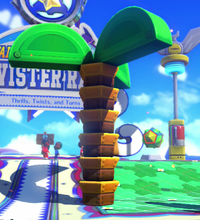
Known as the Palm Tree in the European version.
Monita's notes[edit]
 US version: “Palm trees always evoke such a blissfully tropical mood... Well, at least that's what my databank says, anyway. This one doesn't have any fruit, so that's disappointing.”
US version: “Palm trees always evoke such a blissfully tropical mood... Well, at least that's what my databank says, anyway. This one doesn't have any fruit, so that's disappointing.” European version: “Palm trees evoke a blissfully tropical mood... Or so say my databanks, at any rate. This one has no fruit, so it seems a bit disappointing really.”
European version: “Palm trees evoke a blissfully tropical mood... Or so say my databanks, at any rate. This one has no fruit, so it seems a bit disappointing really.”
Names in other languages[edit]
| Language | Name | Meaning | Notes |
|---|---|---|---|
| ヤシの木? Yashinoki |
Palm Tree | ||
| Palmboom | |||
| Palmier | |||
| Palme | Palm Tree | ||
| Palma | Palm Tree | ||
| Palmeira | Palm Tree | ||
| Palmera | |||
| Пальма Pal'ma |
Palm Tree |
Fungiform Family[edit]
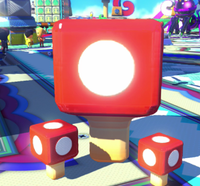
Monita's notes[edit]
 US version: “Just look at this bouquet of brightly colored toadstools. The big one must be the mother, while the little ones are the juveniles. Also, that could be completely incorrect.”
US version: “Just look at this bouquet of brightly colored toadstools. The big one must be the mother, while the little ones are the juveniles. Also, that could be completely incorrect.” European version: “A clump of brightly coloured toadstools. ◆ The big one is the mum and the two little ones are the kids. Or not...”
European version: “A clump of brightly coloured toadstools. ◆ The big one is the mum and the two little ones are the kids. Or not...”
Names in other languages[edit]
| Language | Name | Meaning | Notes |
|---|---|---|---|
| キノコ親子? Kinoko Oyako |
Mushroom Parent and Children | ||
| Paddenstoelenfamilie | |||
| Famille de champignons | |||
| Pilzfamilie | Mushroom Family | ||
| Famiglia fungiforme | Mushroom-shaped family | ||
| Família Fungiforme | Fungiform Family | ||
| Familia fungiforme | |||
| Семья грибов Sem'ya gribov |
Mushroom Family |
Glacial Fungicap[edit]
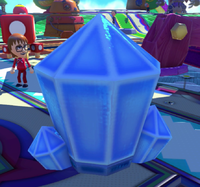
Monita's notes[edit]
 US version}: “This may look like a crystal, but it's actually a very rare and delicate mushroom, which melts away in all but the coldest storage conditions. It is unexpectedly soft to the touch, almost like jelly.”
US version}: “This may look like a crystal, but it's actually a very rare and delicate mushroom, which melts away in all but the coldest storage conditions. It is unexpectedly soft to the touch, almost like jelly.” European version: “It may look like a crystal, but this is really a very rare and delicate mushroom, which melts away in all but the coldest conditions. ◆ It is unexpectedly soft to the touch, almost like jelly.”
European version: “It may look like a crystal, but this is really a very rare and delicate mushroom, which melts away in all but the coldest conditions. ◆ It is unexpectedly soft to the touch, almost like jelly.”
Names in other languages[edit]
| Language | Name | Meaning | Notes |
|---|---|---|---|
| コオリキノコ? Kōri Kinoko |
Ice Mushroom | ||
| IJspaddenstoel | |||
| Champignon de glace | |||
| Eispilz | Ice Mushroom | ||
| Fungo ghiacciato | Frozen mushroom | ||
| Esporo Glacial | Glacial Spore | ||
| Champiñón helado | |||
| Ледниковая поганка Lednikovaya poganka |
Glacial Toadstool |
Herbaceous Kettle[edit]
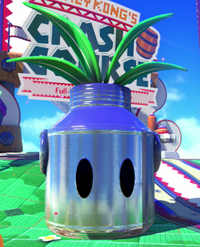
Known as the Amicable Plant in the European version.
Monita's notes[edit]
 US version: “I planted this seed in a metal enclosure instead of an ordinary pot. Why, you may or may not ask? Because I find it highly amusing, of course.”
US version: “I planted this seed in a metal enclosure instead of an ordinary pot. Why, you may or may not ask? Because I find it highly amusing, of course.” European version: “A relaxed plant with a sunny disposition. I put this seedling in a tin milk churn instead of an ordinary plant pot. Why? Well, I suppose to test its mettle...”
European version: “A relaxed plant with a sunny disposition. I put this seedling in a tin milk churn instead of an ordinary plant pot. Why? Well, I suppose to test its mettle...”
Names in other languages[edit]
| Language | Name | Meaning | Notes |
|---|---|---|---|
| 鉄瓶の鉢植え? Tetsubin no Hachiue |
Iron Kettle Potted Plant | ||
| Ketelplantje | |||
| Plante en pot de lait | |||
| Milchbäumchen | Milk Treeling | ||
| Pianta amichevole | Friendly plant | ||
| Planta Amigável | Friendly Plant | ||
| Planta amistosa | |||
| Дружелюбное растение Druzhelyubnoye rasteniye |
Friendly Plant |
Hyperborean Verdant Silo[edit]
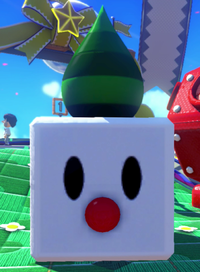
Known as the Frosty Plant in the European version.
Monita's notes[edit]
 US version: “This neat little plant is in a snowman pot for the wintertime. It won't bloom, so I gave it a nose instead.”
US version: “This neat little plant is in a snowman pot for the wintertime. It won't bloom, so I gave it a nose instead.” European version: “An evergreen plant decorated to look like a snowman. ◆ The funny little nose was my idea. It seemed so doleful before.”
European version: “An evergreen plant decorated to look like a snowman. ◆ The funny little nose was my idea. It seemed so doleful before.”
Names in other languages[edit]
| Language | Name | Meaning | Notes |
|---|---|---|---|
| 雪の鉢植え? Yuki no Hachiue |
Snow Potted Plant | ||
| Sneeuwplantje | |||
| Plante en pot hivernal | |||
| Schneemann-Pflanze | Snowman-Plant | ||
| Pianta glaciale | Glacial plant | ||
| Planta Invernal | Wintry Plant | ||
| Planta invernal | |||
| Морозное растение Moroznoye rasteniye |
Frosty Plant |
Sinuated Flora[edit]
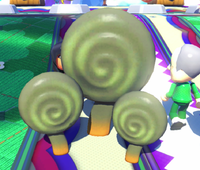
Known as the Fern in the European version.
Monita's notes[edit]
 US version: “Can you identify this plant? No? It's a fern, of course. Oh, mass information storage does have its moments.”
US version: “Can you identify this plant? No? It's a fern, of course. Oh, mass information storage does have its moments.” European version: “Can you identify this plant? No? It's a Lollycoil Woodland Fern, of course. Ahhh, mass information storage does have its moments.”
European version: “Can you identify this plant? No? It's a Lollycoil Woodland Fern, of course. Ahhh, mass information storage does have its moments.”
Names in other languages[edit]
| Language | Name | Meaning | Notes |
|---|---|---|---|
| ゼンマイ? Zenmai |
Osmunda japonica | ||
| Varen | |||
| Crosses de fougère | |||
| Kringelfarn | Curl Fern | ||
| Felce | Fern | ||
| Feto | Fern | ||
| Helecho | |||
| Папоротник Paporotnik |
Fern |
Spiral Timber[edit]
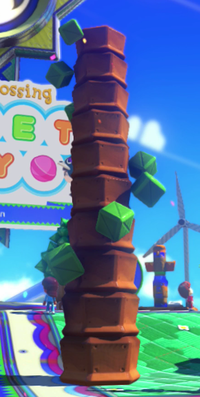
Known as the Twist Tree in the European version.
Monita's notes[edit]
“Tempting as it may be to find out what's up there, please refrain from climbing on this display. Park rules are very clear on this issue.”
Names in other languages[edit]
| Language | Name | Meaning | Notes |
|---|---|---|---|
| ねじれ木? Nejire Ki |
Twist Tree | ||
| Kronkelboom | |||
| Arbre tordu | |||
| Verdrehter Baum | Twisted Tree | ||
| Albero attorcigliato | Twisted tree | ||
| Árvore Retorcida | Twisted Tree | ||
| Árbol entornillado | |||
| Дерево с плющом Derevo s plyushchom |
Tree with Ivy |
Striped Conifer[edit]
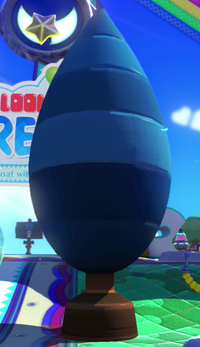
Monita's notes[edit]
 US version: “Once upon a time, a fair maiden awaited her sweetheart's return from battle. She pined and pined, and then kept pining, until she became a blue pine... Oh, it's a spruce. Never mind.”
US version: “Once upon a time, a fair maiden awaited her sweetheart's return from battle. She pined and pined, and then kept pining, until she became a blue pine... Oh, it's a spruce. Never mind.” European version: “Once upon a time, a fair maiden awaited her sweetheart's return from battle. She pined and pined, and then she pined some more, until all that was left was a pine... Oh, it's a spruce. Never mind.”
European version: “Once upon a time, a fair maiden awaited her sweetheart's return from battle. She pined and pined, and then she pined some more, until all that was left was a pine... Oh, it's a spruce. Never mind.”
Names in other languages[edit]
| Language | Name | Meaning | Notes |
|---|---|---|---|
| しましま針葉樹? Shimashima Shin'yōju |
Striped Conifer | ||
| Gestreepte conifeer | |||
| Pin bleu | |||
| Streifen-Zypresse | Striped-cypress | ||
| Conifera striata | Striped conifer | ||
| Pinheiro Riscado | Striped Pine Tree | ||
| Conífera a rayas | |||
| Полосатая ель Polosataya yel' |
Striped Spruce Tree |
Vegetal Pouch[edit]
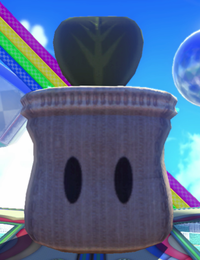
Known as the Pragmatic Plant in the European version.
Monita's notes[edit]
 US version: “The humble cloth sack keeps it warm on chilly fall nights. It looks a bit sad and squishy, doesn't it? I still wouldn't want it falling on my monitor, though.”
US version: “The humble cloth sack keeps it warm on chilly fall nights. It looks a bit sad and squishy, doesn't it? I still wouldn't want it falling on my monitor, though.” European version: “With a hemp sack to keep it warm on cool autumn nights, this plant is rather more practical than decorative. ◆ It looks a bit sad and squishy, doesn't it? I still wouldn't want it falling on my monitor, though.”
European version: “With a hemp sack to keep it warm on cool autumn nights, this plant is rather more practical than decorative. ◆ It looks a bit sad and squishy, doesn't it? I still wouldn't want it falling on my monitor, though.”
Names in other languages[edit]
| Language | Name | Meaning | Notes |
|---|---|---|---|
| 布袋の鉢植え? Nunobukuro no Hachiue |
Cloth Bag Potted Plant | ||
| Plantje in een jutezak | |||
| Plante en toile de jute | |||
| Jute-Pflanze | Jute-Plant | ||
| Pianta pragmatica | Pragmatic plant | ||
| Planta Pragmática | Pragmatic Plant | ||
| Planta pragmática | |||
| Находчивое растение Nakhodchivoye rasteniye |
Resourceful Plant |
Verdant Silo[edit]
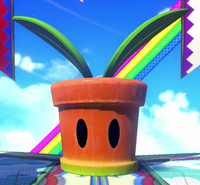
Known as the Perky Plant in the European version.
Monita's notes[edit]
 US version: “This lovely plant is full of spring vitality! My scans confirm that the dots on the pot are eyes... No, really.”
US version: “This lovely plant is full of spring vitality! My scans confirm that the dots on the pot are eyes... No, really.” European version: “A cheerful plant filled with spring vitality! ◆ My scans confirm that the dots on the pot are eyes... No, really.”
European version: “A cheerful plant filled with spring vitality! ◆ My scans confirm that the dots on the pot are eyes... No, really.”
Names in other languages[edit]
| Language | Name | Meaning | Notes |
|---|---|---|---|
| 陶器の鉢植え? Tōki no Hachiue |
Ceramic Potted Plant | ||
| Potplantje | |||
| Plante en pot | |||
| Flotte Pflanze | Fast Plant | ||
| Pianta vivace | Lively plant | ||
| Planta Espevitada | Lively Plant | ||
| Planta optimista | |||
| Забавное растение Zabavnoye rasteniye |
Funny Plant |
Verging Bloom[edit]
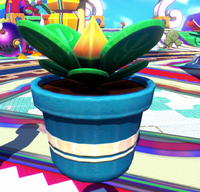
Known as the Budding Bloom in the European version.
Monita's notes[edit]
 US version: “This plant is brimming with potential. Apparently, the blue pot perfectly complements the flower, but we won't know until it blooms.”
US version: “This plant is brimming with potential. Apparently, the blue pot perfectly complements the flower, but we won't know until it blooms.” European version: “A plant that's brimming with potential. Apparently, the blue pot perfectly complements the flower, but we won't know until it blooms.”
European version: “A plant that's brimming with potential. Apparently, the blue pot perfectly complements the flower, but we won't know until it blooms.”
Names in other languages[edit]
| Language | Name | Meaning | Notes |
|---|---|---|---|
| いつか花咲く蕾? Itsuka Hanasaku Tsubomi |
Bud That Will Bloom Someday | ||
| Ontsproten knop | |||
| Plante bourgeonnante | |||
| Verschlossene Knospe | Closed Bud | ||
| Germoglio | Bud | ||
| Rebento por Florir | Bud Yet-to-Bloom | ||
| Brote por florecer | |||
| Растение с бутоном Rasteniye s butonom |
Plant with a Bud |
Unidentified vegetation[edit]
There are some other plants that are not given a name, but are similar to vegetation in the canon games, identified or not.
A group of clovers.
A Glowing Mushroom resembling a Common Glowcap.
A Mega Mushroom from the Mario series.
These plants are unknown but they're likely a group of Sinuated Flora in a pot.



